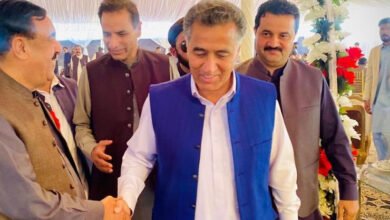FP tells reasons about how Imran Khan becoming symbol of fear for political rivals
The global magazine, Foreign Policy (FP), revealed how PTI chief Imran Khan is becoming a symbol of fear for his political rivals.

The global magazine, Foreign Policy (FP), has revealed how Pakistan Tehreek-e-Insaf (PTI) chief and former premier Imran Khan is becoming a symbol of fear for his political rivals.
An article published by the Foreign Policy (FP) magazine on August 31 read, “The center of gravity in this dispute remains former Pakistani Prime Minister Imran Khan who, since being deposed in April through a no-confidence vote, has been pressing for early general elections. The incumbent coalition government, led by Prime Minister Shehbaz Sharif, has resisted Khan’s pressure. Sharif and his backers in the Pakistan Army fear Khan’s party, the Pakistan Tehreek-e-Insaf (PTI), could come in first or even sweep the polls.”
Their worries are substantiated. Since losing power at the national level, Khan’s PTI has shown formidable power on the street and at the ballot box. PTI has pulled off massive rallies almost every other week in one city after another. And it has performed exceptionally well in provincial by-elections.
Even with Monday’s announcement of the resumption of the International Monetary Fund (IMF) bailout program, economic conditions in Pakistan will remain precarious at least into next year. Inflows from the IMF and other bilateral and multilateral partners will help Pakistan reverse the fast depletion of its foreign exchange reserves and avoid default. But the IMF projects inflation this fiscal year, which ends next June, to remain around 20 percent, making it hard for the Sharif government to restore public support ahead of general elections. (General elections must take place by October 2023. But Khan, eager to leverage his momentum, wants them to be held this year.)
The global magazine also resembled Imran Khan with late premier Zulfikar Ali Bhutto and wrote, “Khan’s rhetoric resembles that of another former Pakistan Army protege: the late Prime Minister Zulfikar Ali Bhutto.”
The political crisis in Pakistan, however, is a challenge not just for the Sharif government and the Pakistan Army’s top brass, but also for the United States. Khan claims he was ousted as part of a U.S.-backed regime-change conspiracy because he refused to give the U.S. military basing rights in Pakistan. His allegations lack substantiation. Nonetheless, many Pakistanis believe them to be true—with 46 percent surveyed in late May and early June attributing his downfall to a “foreign conspiracy.”
The enduring secrecy of U.S. activity in the region only serves to deepen local suspicions of a conspiracy. Several drone strikes have taken place in Afghanistan this month, including one reportedly carried out by the CIA that killed al-Qaeda chief Ayman al-Zawahiri. It’s unclear where the drones took off from and how they reached Afghan air space. But their occurrence hardens the belief of some that the Pakistani military has given the United States basing or overflight rights after Khan’s sacking as part of some quid pro quo.
Although Pakistan is off most people’s radar in Washington these days, the United States is enmeshed in an internal power struggle in Pakistan. And its ingredients—a populist, nationalist politician at odds with the United States and an ambitious general who sees him as an obstacle—rhyme with the country’s tragic past.
The article further read, “Khan still retains the support of much of the army rank and file, prominent former officers, and an unknown number of serving officers. But his rhetoric also resembles that of another former army protege: the late Prime Minister Zulfikar Ali Bhutto, who rose in the 1950s and 1960s during Gen. Ayub Khan’s tenure only to ultimately turn against the general. After five-and-a-half years of leading Pakistan, Bhutto was executed under the rule of Gen. Muhammad Zia-ul-Haq in 1979.”
“Pakistan is no great power. Its economy is in shambles. But it is the world’s fifth most populous country and a nuclear power. Neither the United States nor Pakistan can afford a permanent rift. In the end, the two countries must figure out how to escape the ghost of Bhutto.”



